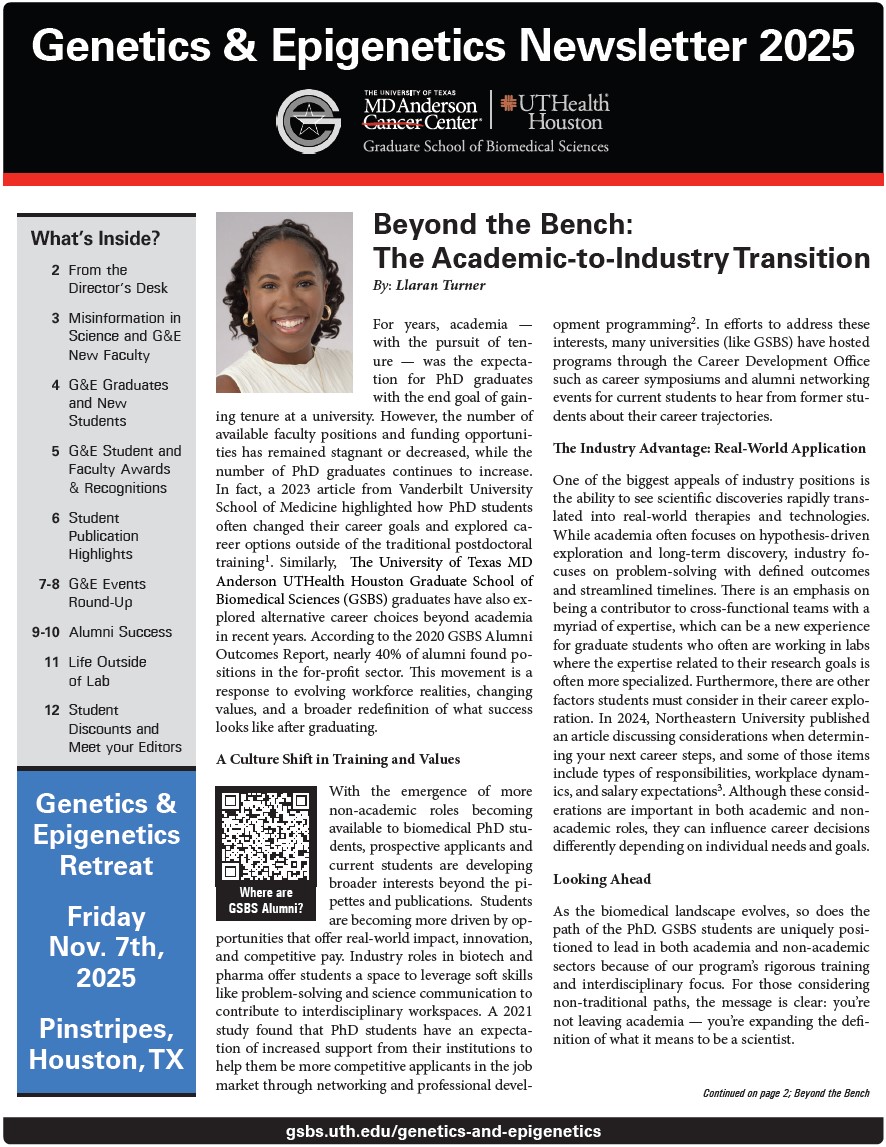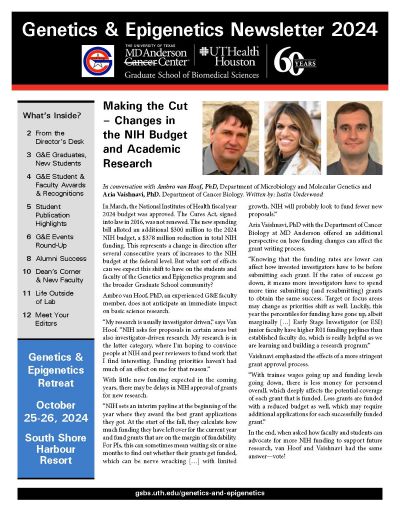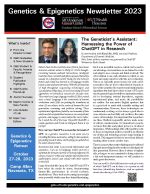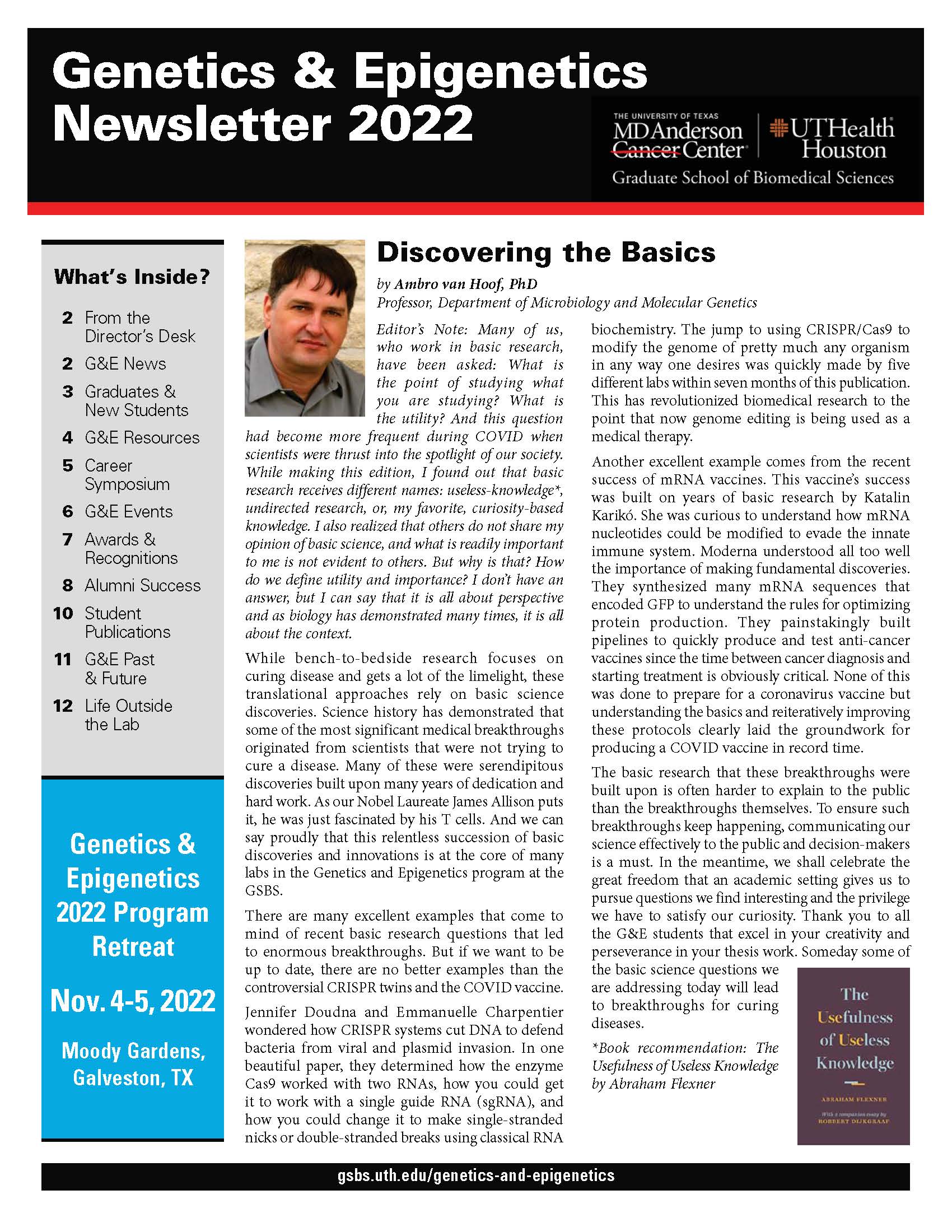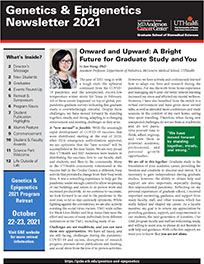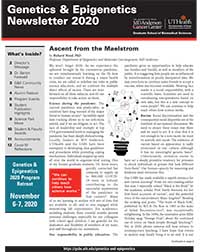Latest G&E Students to Win GSBS Fellowships and Scholarships!
Brandy Walker (Advisor, Rachel Miller, PhD) President’s Research Excellence Award, 2024-2025
Mith V (Advisor, Gigi Lozano, PhD) The Pauline Altman-Goldstein Discovery Fellowships, 2024-2025
Bhargavi Brahmendra Barathi (Advisor, Jason Huse, MD, PhD): 2024-25 UTHealth Houston | Leads MD Anderson UTHealth Houston Graduate School fellow
Richa Nayak (Advisor, Yejing Ge, PhD): Schissler Foundation Fellowship, 2024-2025
Mo-Fan (Elena) Huang (Advisor, Dung-Fang Lee, PhD): GSEC Dean's Research Award, 2024
Ericka Humphrey (Advisor, Yejing Ge, PhD):2023-2024 UTHealthLeads MD Anderson UTHealth Houston Graduate Student School Fellows
Heather Tsong (Advisor, Andrea Stavoe, PhD): 2023-2024 UTHealthLeads MD Anderson UTHealth Houston Graduate Student School Fellows
Mo-Fan (Elena) Huang (Advisor, Dung-Fang Lee, PhD): Dr. John J. Kopchick Fellow, 2024
Mith V (Advisor, Gigi Lozano, PhD): Graduate School of Biomedical Sciences Endowment Scholarship, 2023-2024
Mary Adeyeye (Advisor, Xiangli Yang, PhD): Michael E. Kupferman, M.D. Fellowship. Dr. Kupferman, 2023-2024
Shannon Erhardt (Advisor, Jun Wang, PhD): Jesse B. Heath, Jr. Family Legacy Award, 2023-2024
Brandy Walker (Advisor, Rachel Miller, PhD): Gigli Family Endowed Scholarship, 2023-2024
Dalia Hassan (Advisor, Jichao Chen, PhD:) T.C. Hsu Memorial Scholarship, 2023-2024
Ahmed Emam (Advisor, John Tainer, PhD): Steve Lasher and Janiece Longoria Graduate Student Research Award in Cancer Biology, 2023-2024
Majo Gacha Garay (Advisor, Jichao Chen, PhD): R.W. Butcher Student Achievement Award, 2023-2024
Ericka Humphrey (Advisor, Yejing Ge, PhD): Wei Yu Family Endowed Scholarship, 2023-2024
Heather Tsong (Advisor, Andrea Stavoe, PhD): 1st Place Platform Talk - 2023 G&E Retreat
Han Bit Baek (Advisor, Swathi Arur, PhD): 2nd Place Platform Talk - 2023 G&E Retreat
Llaran Turner (Advisor, George Eisenhoffer, PhD): People’s Choice Platform Talk - 2023 G&E Retreat
Samantha Mota (Advisor, Michael Galko, PhD): 1st Place Pre-Candidacy Poster (tie) - 2023 G&E Retreat
Sseu-Pei Hwang (Advisor, Catherine Denicourt, PhD): 1st Place Pre-Candidacy Poster (tie) - 2023 G&E Retreat
Anna Miao (Advisor, Don Gibbons, PhD): 1st Place Pre-Candidacy Poster (tie) - 2023 G&E Retreat
Mo-Fan (Elena) Huang (Advisor, Dung-Fang Lee, PhD): 1st Place Post-Candidacy Poster - 2023 G&E Retreat
Majo Gacha Garay (Advisor, Jichao Chen, PhD): 2nd Place Post-Candidacy Poster - 2023 G&E Retreat
Guillaume Trusz (Advisor, Michael Curran, PhD): 1st Place Pre-Candidacy Poster Flash Talk - 2023 G&E Retreat
Jace Aloway (Advisor, Richard Behringer, PhD): 1st Place Post-Candidacy Poster Flash Talk - 2023 G&E Retreat
Melissa Frasca (Advisor, Francesca Cole, PhD): Linda M. Wells GSBS Outreach Award, 2023
Mo-Fan (Elena) Huang (Advisor, Dung-Fang Lee, PhD): Rosalie B. Hite Fellowship, 2023-2024 renewal
Hanghui Ye (Advisor, Nick Navin, PhD): Andrew Sowell - Wade Huggins Fellowship in Cancer Research, 2023-2024 renewal
Llaran Turner (Advisor, George Eisenhoffer, PhD): 2023-2024 American Legion Auxiliary Fellowship in Cancer Research
Vahid Bahrambeigi (Advisor, Anirban Maitra, MBBS): Dr. John J. Kopchick Fellow, 2023
Mo-Fan (Elena) Huang (Advisor, Dung-Fang Lee, PhD): The Antje Wuelfrath Gee and Harry Gee, Jr. Family Legacy Scholarship, 2022-2023
Celine Kong (Advisor, Jichao Chen, PhD): Dr. John J. Kopchick Fellow, 2023 Renewal
Heather Tsong (Advisor, Andrea Stavoe, PhD): Investing in Student Futures Fellowship, 2022-2023
Ruoyu Wang (Advisor, Wenbo Li, PhD): Dr. John J. Kopchick Fellow, 2023 Renewal
Ruoyu Wang (Advisor, Wenbo Li, PhD): 2022-2023 Presidents' Research Excellence Award
Ruoyu Wang (Advisor, Wenbo Li, PhD): 2022 GSBS Presidents' Research Scholarship
Ericka Humphrey (Advisor, Yejing Ge, PhD):2022-2023 Deans Excellence Scholarship - Renewal
Hanghui Ye (Advisor, Nicholas Navin, PhD): Sowell-Huggins Fellowship in Cancer Research, 2022-2023 renewal
Ruoyu Wang (Advisor, Wenbo Li, PhD): John and Rebekah Harper Fellowship in Biomedical Sciences, 2022-2023 renewal
Vahid Bahrambeigi (Advisor, Anirban Maitra, MBBS): Rosalie B. Hite Fellowship, 2022-2023 renewal
Vahid Bahrambeigi (Advisor, Anirban Maitra, MBBS): American Legion Auxiliary Fellowship in Cancer Research, 2022-2023
Maria Gacha Garay (Advisor, Jichao Chen, PhD): Larry Deaven Ph.D. Fellowship in Biomedical Sciences, 2022-2023
Nick Newkirk (Advisor, Swathi Arur, PhD): American Legion Auxiliary Fellowship in Cancer Research, 2022-2023
Mo-Fan (Elena) Huang (Advisor, Dung-Fang Lee): Rosalie B. Hite Fellowship, 2022-2023
See list of G&E student award recipients in 'Awards' section.
G&E GSBS Student Research Day 2025 Award Winners:
Shannon Erhardt (Advisor, Jun Wang, PhD) 1st place,Oral Presentation Skills, Post-Candidacy PhD
Renee Rubiano (Advisor, Alejandro Aballay, PhD), 1st Year Award:, Top 4 - Poster Competition, Pre-Candidacy PhD, MS & SMS, 1st Year
Richa Nayak (Advisor, Yejing Ge, PhD), Top 5 - Poster Competition (Due to a tie), Post-Candidacy PhD
Ryan Sloan (2nd ARC) (Advisor, Jayhun Lee, PhD) Top 5 - Poster Competition (Due to a tie), Post-Candidacy PhD
G&E GSBS Student Research Day 2024 Award Winners:
Xing-Han Zhang (Advisor, Georgios Karras,PhD): 2nd place, Oral Presentation Skills, Pre-Candidacy PhD, MS & SMS
Guillaume Trusz (Advisor, Michael Curran, PhD) Top 4, Poster Competition, Post-Candidacy PhD
Llaran Turner (George T. Eisenhoffer, PhD): Top 4, Poster Competition, Post-Candidacy PhD
Richa Nayak (Advisor, Yejing Ge, PhD), 1st place, Elevator Pitch Contest- Post-Candidacy PhD
G&E GSBS Student Research Day 2023 Award Winners:
Llaran Turner (Advisor, George Esienhoffer, PhD): 1st place, Oral Presentation Skills, Pre-Candidacy PhD, MS & SMS, 1st Year
Bhargavi Brahmendra Barathi (Advisor, Jason Huse, MD, PhD): 1st place Elevator Speech Competition, Pre-Candidacy PhD, MS & SMS, 1st Year
Heather Tsong (Advisor, Andrea Stavoe, PhD): 2nd place, Oral Presentation Skills, Post-Candidacy PhD
G&E GSBS Student Research Day 2022 Award Winners:
Shannon Erhardt (Advisor, Jun Wang, PhD): 2nd place, Oral Presentation Skills, Pre-Candidacy PhD, MS & SMS, 1st Year
Raisa Reyes Castro (Advisor, Swathi Arur, PhD): 1st place, Poster Competitions, Post-Candidacy PhD
Boyi Gan Receives 2021 MD Anderson Faculty Achievement Award in Basic Research (August 2021)
Boyi Gan, PhD, G&E faculty member and Associate Professor, Department of Experimental Radiation Oncology at MD Anderson is the recipient of the MD Anderson Dallas/Fort Worth Living Legend Faculty Achievement Award in Basic Research. His award will be presented at the Faculty Honors Convocation later this year.
David Johnson, PhD Receives 2021 Oldham Faculty Award (August 2021)
David Johnson, PhD, G&E faculty member and Professor, Department of Epigenetics and Molecular Carcinogenesis at MD Anderson is the recipient of the 2021 D. Dudley and Judy White Oldham Faculty Award. As noted in the GSBS Essential: "The purpose of the award is to recognize an exceptional faculty member who consistently demonstrates excellence in service and leadership at the school".
G&E Director Wins McGovern Teaching Award (July 2021)
Dr. Jichao Chen, G&E Director and Associate Professor of Pulmonary Medicine-Research at MD Anderson wins 2021 McGovern Award for Outstanding Teaching. This award recognizes excellence in teaching based on the educator’s knowledge of the subject, interest in/enthusiasm for teaching, interest in and understanding of students, responsiveness to student questions and encouragement of independent thinking, and accessibility to students. Each year, GSBS students nominate and vote for the winner.
G&E Library
G&E offers a lending library located in Amy Carter’s office at GSBS. More than 40 books will be available for check-out. From biology textbooks, scientific resources and biographies, to R programming, writing guides, and personal productivity, you'll find a huge breadth of topics of interest to our graduate program community. See book list here.














